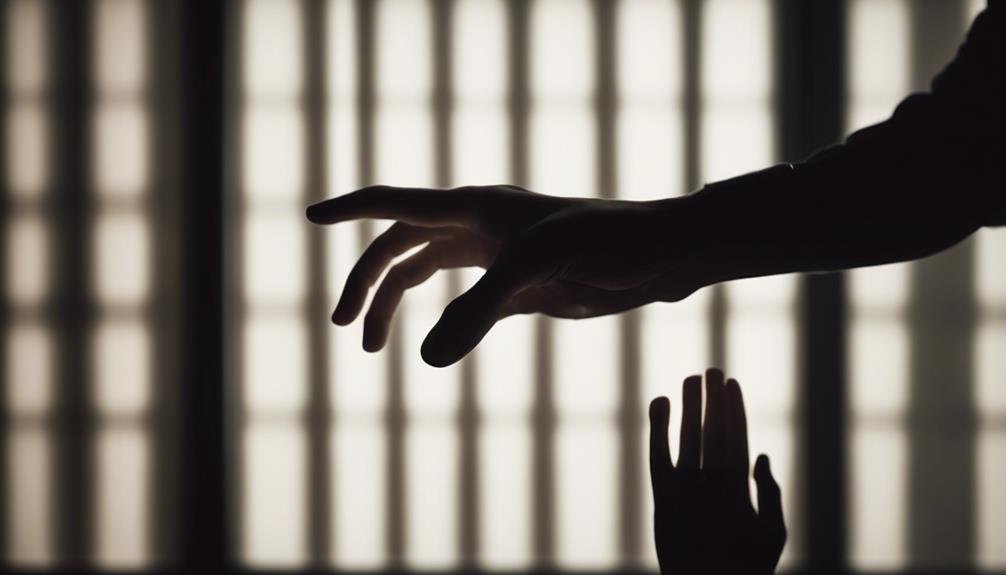If you’re stuck in an abusive relationship, you can find a way to break free. Recognize the signs, like control and isolation. Your safety is top priority. Reach out to hotlines and shelters for help. Remember, you’re not alone in this. Start taking steps towards a life without abuse.
Key Takeaways
- Develop a safety plan and escape tactics.
- Contact domestic violence hotlines and shelters.
- Pack essentials and important documents.
- Seek counseling and build a support system.
- Prioritize your safety and well-being.
Recognizing Abuse and Seeking Help
If you suspect that you’re in an abusive relationship, it’s important to recognize the signs and seek help as soon as possible.
Signs of abuse may include controlling behavior, emotional manipulation, physical violence, or isolation from loved ones.
Your safety is paramount, and intervention is vital to breaking free from this harmful cycle.
Seeking help from resources like domestic violence hotlines, shelters, or counseling services can provide you with the support and guidance needed to navigate this difficult situation.
Remember, you aren’t alone, and there are people ready to assist you in finding a path to safety and healing.
Reach out and take the first step towards a life free from abuse.
Safety Planning and Escaping Tactics
Developing a safety plan and preparing escape tactics are crucial steps for individuals seeking to leave an abusive relationship. Safety measures like keeping important documents and a packed bag ready can help you leave quickly if needed.
Establish escape plans, including knowing safe exits and having a trusted person to contact. Coping strategies such as reaching out to domestic violence hotlines and building support systems with friends and family can provide emotional strength.
Utilizing Support Services and Shelters
Utilize available support services and shelters to access essential resources and safeguard your safety when leaving an abusive relationship. Supportive communities can provide the understanding and assistance you need during this challenging time.
Shelters offer a safe space, basic necessities, and legal guidance to help you rebuild trust and feel secure. Emotional healing and finding closure are vital aspects of your journey, and these services can offer the support you require to navigate these processes.
Surround yourself with caring individuals who can guide you through this change and empower you to take steps towards a brighter future. Remember, you deserve to be safe and supported as you work towards reclaiming your life from abuse.
Protecting Yourself During and After
Safeguard your safety and well-being during and after leaving an abusive relationship by taking proactive measures to protect yourself. Consider learning self-defense techniques to empower yourself physically and mentally.
Explore legal options like obtaining restraining orders to enhance your safety.
Focus on achieving financial independence to reduce reliance on the abuser.
Engage in self-care practices such as therapy, meditation, or hobbies to nurture your mental health.
Remember, your safety is a priority, and seeking help from support services is essential.
Healing From Trauma and Moving Forward

Healing from the trauma of domestic violence is an essential step towards reclaiming your sense of self and moving forward towards a life free from abuse.
Trauma recovery is a journey that requires patience and self-compassion. Seeking counseling can aid in addressing the mental health effects of abuse, providing a safe space to process emotions and develop coping strategies.
Moving forward involves acknowledging the impact of the trauma while also focusing on personal growth and healing. Remember, you deserve to live a life free from abuse, and taking steps towards healing is a courageous act of self-love.
Ensuring Internet Security and Privacy
As you navigate the process of healing from trauma and moving forward, guaranteeing your internet security and privacy is essential for your safety and well-being.
When seeking help for domestic abuse, take steps to clear browser and email evidence to safeguard sensitive information from abusers.
To maintain online safety and privacy, uphold digital security while researching domestic abuse and seeking assistance.
Implement privacy measures to protect yourself during the process of leaving an abusive relationship.
By following guidelines for safeguarding your privacy online, you can take proactive steps to maintain your safety and security as you move towards a life free from abuse.
Stay vigilant in safeguarding your online presence to protect yourself during this critical time.
Accessing Mental Health Support

Ensuring you have access to mental health support is vital as you navigate the process of healing from trauma and moving towards a healthier future. Therapy options and counseling benefits can aid in your healing process. Seeking professional help can provide you with coping strategies, emotional support, and guidance to work through the impact of abuse.
Remember that self-care is essential in this journey. Taking time for yourself, engaging in activities you enjoy, and practicing mindfulness can contribute to your overall well-being. Counseling offers a safe space to express your feelings, process your experiences, and develop healthy coping mechanisms.
Embracing mental health support is a significant step towards reclaiming your happiness and rebuilding your life.
Frequently Asked Questions
How Can I Help a Friend Who Is in an Abusive Relationship?
You can assist a friend in an abusive relationship by offering support, intervention strategies, and encouraging safety planning. Respect their communication boundaries, connect them with support systems, and provide a listening ear to help them navigate this challenging situation.
Is It Possible to Maintain a Relationship With Family While Leaving an Abuser?
You can maintain a relationship with family while leaving an abuser by setting clear boundaries and seeking emotional support. Prioritize your safety and well-being, communicate openly, and remember that it’s okay to distance yourself from toxic dynamics for your own healing.
What Legal Steps Can I Take to Protect Myself From My Abuser?
You can take legal steps to safeguard yourself from your abuser. Seek protection orders through the court system. These orders provide legal protection and can help guarantee your safety and well-being as you navigate this challenging situation.
Are There Resources Available for Abusers Who Want to Change Their Behavior?
You can find resources for abusers seeking change. Counseling options, rehabilitation programs, support groups, and intervention techniques are available. Seek help, embrace growth, and commit to positive transformation. Support is here for your journey towards healthier relationships.
How Can I Support a Loved One Who Is a Survivor of Domestic Violence?
You can support a loved one who is a survivor of domestic violence by offering emotional support, encouraging counseling, helping with safety planning, and respecting their boundaries. Your understanding and care can make a meaningful difference.
Conclusion
You’ve taken the first step towards freedom, and now it’s time to soar. Remember, you’re stronger than you know, braver than you believe, and deserving of a life filled with love and respect.
With the right support and determination, you can break free from the chains of abuse and rebuild a future brighter than the sun. You’ve got this, and the world is waiting for you to shine.







